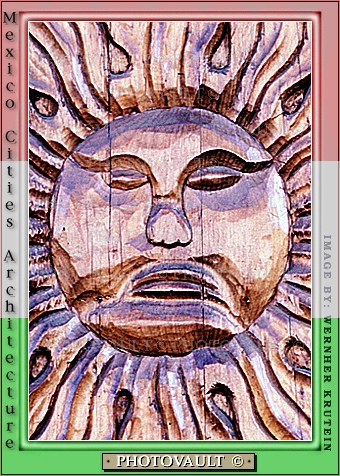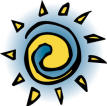

This is the simple dictionary definition of "sun". But there are many other words that use some derivative of the word to create new or related terms, suggesting that "sun" means much more than the definition above would suggest. Here are just a few examples of "sun" use and the etyomologies behind them. Have fun!
SUNFISH:
pl. sunfish or sun·fish·es
1. Any of various small North American percoid freshwater fishes of the family Centrarchidae, having laterally
compressed, often brightly colored bodies and including the crappies, black bass, bluegill, and pumpkinseed.
2. Any of several large marine fishes of the family Molidae, especially the ocean sunfish.
(American Heritage Dictionary)
Etymology: After that definition, the etymology should be no surprise. The name comes from the roundish body and the
bright colors of the fish that recall the sun.
MIDNIGHT SUN:
NOUN: The sun as seen at midnight during the summer within the Arctic and Antarctic regions. Bodo, in northern Norway, is referred to as the Land of the Midnight Sun because for one month during the summer the sun does not fully set. Here, the sun even shines on the Arctic Ocean during a summer night.
(American Heritage Dictionary)
Etymology: This one comes from pure observation. Wouldn't it be great to see the sun at midnight?
It really makes the terms "day" and "night" seem meaningless!
SUNDAY:
NOUN:
1. abbr. Sun. or S; The first day of the week.
2. The Sabbath for many Christians
(American Heritage Dictionary)
Etymology: from Old English sunnandæg, Sunday, from Germanic compound sunnon-dagaz,
“day of the sun” (translation of Latin dies solis)
The etymology suggests to me the importance of the sun and its place in beginning new things (ie: the week).
It distinguishes the sun and honors it in a special way.
SUN BITTERN
NOUN: A cranelike tropical American bird (Eurypyga helias), having mottled brownish plumage and
often spreading its wings and tail in a showy display.
(American Heritage Dictionary)
Etymology: Like "sunfish", the orign of this word comes from the behavior and appearence of the
bird. Because the sun is so prominent in our lives, we associate it with brightness and display. Much like
this bird, it catches the eye.
PARASOL
NOUN: A light, usually small umbrella carried as protection from the sun.
(American Heritage Dictionary)
Etymology: This is a hybrid from many languages, but the word "sun" is still in there!
French, from Italian parasole : parare, to shield
(from Latin parre, to prepare) + sole, sun (from Latin sol)
SUNFLOWER
NOUN: 1a. Any of several plants of the genus Helianthus, especially H. annuus, having tall coarse stems
and large, yellow-rayed flower heads that produce edible seeds rich in oil. b. The seedlike fruit or the seeds of this plant.
2. A brilliant yellow to strong or vivid orange yellow.
SUNCHOKE
NOUN: also known as "Jerusalem artichoke"
1. A North American sunflower (Helianthus tuberosus) having yellow, rayed flower
heads and edible tubers.
2. The tuber of this plant, eaten as a vegetable.
(American Heritage Dictionary)
Etymology: The color of the flower heads gives this one away; yellow is almost always associated
with sunlight. A sunflower not only has the color of the sun, but its flower orients itself to face the sun!
By folk etymology from Italian girasole, or sunflower: girare, to turn + sole, sun (from Latin sol)
PERIHELION
NOUN: The point nearest the sun in the orbit of a planet or other celestial body.
(American Heritage Dictionary)
Etymology: This word is a combination of Greek and Latin roots: two languages that give us many common
words in the English language.
Alteration of New Latin perihelium : peri– (around, near) + Greek helios, sun
SUN PILLAR
NOUN: A phenomenon where sunlight reflects off of distant falling ice crystals. Often, pillars of light seem to form between the sky and the earth.
(NASA)
Etymology: This is another word created in an attempt to describe a visual event. The derivation becomes clear from the image of a sun pillar in Jigsaw Puzzle 3 on this site.
Back to the main SUNBEAMS page
